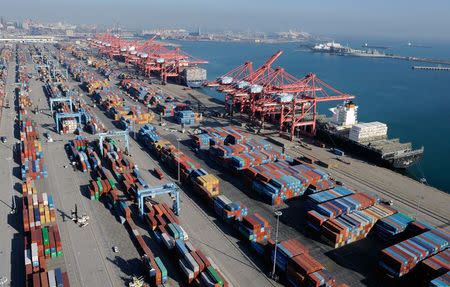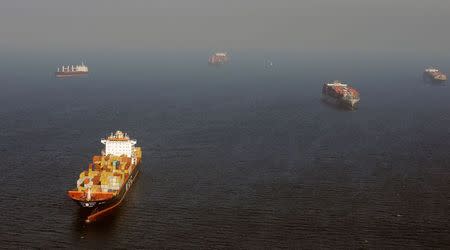West Coast port operations resume, more labor talks scheduled
By Steve Gorman LOS ANGELES (Reuters) - U.S. West Coast port operations resumed in full on Monday after shipping companies suspended loading and unloading of freighters for the weekend, citing chronic cargo backups the shippers and dockworkers have blamed on each other during months of labor tensions. Reopening of the ports to cargo vessels idled by the weekend suspension and the freight traffic slowdowns leading up to it came as the dockworkers' union and shippers were set to resume labor negotiations later in the day, the two sides said. Shippers and terminal operators announced last week they would halt cargo crane operations for container vessels at the ports on Saturday and Sunday because of mounting congestion that they said has brought the docks to virtual gridlock. The 29 affected ports handle nearly half of all U.S. maritime trade and more than 70 percent of Asian imports. The companies, represented by the Pacific Maritime Association, have accused the International Longshore and Warehouse Union of instigating work slowdowns to gain leverage at the bargaining table. The union denies this and has faulted the carriers for the worsening congestion, citing numerous changes in shipping practices as contributing factors. The weekend suspension of vessel loading and unloading added to the discord surrounding negotiations for a new contract for 20,000 dockworkers that have dragged on for nine months. Union officials insisted a settlement was near in the federally mediated talks, calling the shippers' move another act of public posturing. Still, work continued in the terminal yards through the weekend to clear cargo containers that have been stacking up on the waterfronts, according to Pacific Maritime Association spokesman Steve Getzug, at least at the five busiest ports - Los Angeles, Long Beach, Oakland, Seattle and Tacoma. RIPPLE EFFECTS The crippling backups at the ports that began in October have rippled through the U.S. commercial supply chain, disrupting shipments of a wide range of goods affecting agriculture, manufacturing, transportation and retail. The Obama administration is closely monitoring the situation, White House spokesman Frank Benenati said on Monday, but the dispute "is up to the two parties to resolve at the bargaining table." "We urge them to do so as expeditiously as possible," he said. The last time contract talks led to a full shutdown of the West Coast ports was in 2002, when the companies imposed a lockout that was lifted 10 days later under a court order sought by President George W. Bush, invoking the 1947 Taft-Hartley Act. The PMA has estimated the 2002 lockout caused $15.6 billion in economic losses. When it ended, some 200 freighters were waiting at anchor to be unloaded up and down the coast. By comparison, 23 vessels were anchored awaiting berths on Monday morning outside Los Angeles and Long Beach, down from 31 on Sunday, port authorities said. The National Association of Manufacturers, which projects a new 10-day port shutdown could cost the U.S. economy $2.1 billion a day, urged the administration to ratchet up pressure for a settlement. "We think the administration has to do more than just monitor," said Robyn Boerstling, the group's transportation director. "If the administration can impart a message of urgency, that would certainly be helpful." She said a number of manufacturers had reported that uncertainty surrounding the ports dispute had already led some Asian buyers to cancel their U.S. factory orders. (Additional reporting by Editing by Krista Hughes in Washington Will Dunham)


